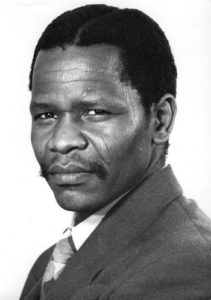
Oliver Tambo
Oliver Tambo, a Black African politician and activist, was born on this date in 1917.
Oliver Reginald Tambo was born in the village of Kantolo near Bizana in Pondoland, South Africa. His mother, Julia, was the third wife of Mzimeni Tambo, the son of a farmer and assistant salesman at a local trading store. Tambo’s parents were traditionalists, but they also recognized the importance of Western education, and he was sent to school.
As he grew older, he desired to leave home and gain wider experience, so he enrolled at Holy Cross, a missionary school at Flagstaff. His father could not afford his fees, but the school found sponsorship for him through two white-English sisters.
One of his older brothers, who worked as a migrant laborer in Natal, also sent a portion of his wages to cover additional costs. After five years at Holy Cross, he was accepted at St Peter’s, a well-known school for Black children in Johannesburg. He was exposed to youngsters of other traditional African cultures and institutionalized segregation and white racism for the first time.
In 1933, when he was 16, Tambo was orphaned when his parents passed away within a year. During this time, Tambo achieved an excellent pass, which resulted in the Eastern Cape assembly of chiefs, the Bhunga, granting him a bursary to further his education at the University of Fort Hare. Tambo initially decided to study medicine, but no university medical school would accept Black students at the time. He chose a course in the sciences, and three years later, he graduated with a B.S. degree in mathematics and physics.
After he was elected chairperson of the Students’ Representative Council of his residence, the Anglican Beda Hall, he organized a student protest and was expelled from Fort Hare. He returned to his home in Kantolo to look for employment to support his siblings and was offered a position as a Master's in Mathematics at his alma mater, St Peter’s. At that time, Johannesburg was an exciting melting pot of cultures for young, upcoming Africans. Tambo soon became involved with Walter Sisulu, Anton Lembede, Jordan Ngubane, and Nelson Mandela, a fellow student from the University of Fort Hare. The group regularly visited the house of Dr. Xuma, a medical doctor who was also the President of the African National Congress (ANC).
They formulated a plan to revive the ANC and make it more accessible to ordinary people. In 1944, the ANC Youth League (ANCYL) and the Women’s League were established. Anton Lembede was elected chairman of the new ANCYL, with Tambo as its secretary and Walter Sisulu as its treasurer. In forty-eight, the National Party came into power, and several discriminatory laws were implemented. To challenge these laws, Tambo decided to study law through correspondence, and in 1952, he joined Mandela's law practice to assist Africans in their struggle against apartheid. In 1953, Tambo was appointed as the ANC National Secretary instead of Walter Sisulu, who the government had banned due to the Defiance Campaign. In 1955, Tambo became engaged to Adelaide Tsukudu, a Youth League activist and nurse employed at Baragwanath Hospital. They were married in December 1956; the couple had three children.
In the aftermath of the Sharpeville Massacre, Tambo went on a "Mission in Exile" to gain international support for the South African liberation movement. Tambo emerged as one of the movement's foremost advocates of women’s rights.
As the ANC president during the 1980s, Tambo was increasingly recognized by the Organization of African Unity as a head of state in exile. He also promoted Nelson Mandela as a symbol of worldwide political freedom and resistance to racial intolerance. Tambo led the group that formulated the Harare Declaration, and because of the grueling schedule he was subjected to, his health began deteriorating, resulting in a mild stroke in 1982.
Disregarding the advice of his medical advisers, Tambo did not ease his efforts, and in 1989, after the presentation of the Harare Declaration, he collapsed and suffered a severe stroke. While Tambo recuperated, Nelson Mandela and other political prisoners were released. In December 1990, Tambo returned home and attended the first ANC Congress held in South Africa since it was banned. Nelson Mandela was elected president of the ANC, and Tambo was its national chairman.
Tambo spent the remaining three years of his life at his sister’s house in Kantolo, the home he had longed for during his long years in exile. During the early hours of the morning of April 23, 1993, Oliver Tambo suffered a massive and fatal stroke. He was honored with a state funeral.
Africana: The Encyclopedia of the African and
African American Experience
Editors: Kwame Anthony Appiah and Henry Louis Gates Jr.
Copyright 1999
ISBN 0-465-0071-1